Books
Books

Reading Sedgwick
Over the course of her long career, Eve Kosofsky Sedgwick became one of the most important voices in queer theory, and her calls for reparative criticism and reading practices grounded in affect and performance have transformed understandings of affect, intimacy, politics, and identity. With marked tenderness, the contributors to Reading Sedgwick reflect on Sedgwick's many critical inventions, from her elucidation of poetry's close relation to criticism and development of new versions of queer performativity to highlighting the power of writing to engender new forms of life. As the essays in Reading Sedgwick demonstrate, Sedgwick's work is not only an ongoing vital force in queer theory and affect theory; it can help us build a more positive world in the midst of the bleak contemporary moment.
Contributors. Lauren Berlant, Kathryn Bond Stockton, Judith Butler, Lee Edelman, Jason Edwards, Ramzi Fawaz, Denis Flannery, Jane Gallop, Jonathan Goldberg, Meridith Kruse, Michael Moon, José Esteban Muñoz, Chris Nealon, Andrew Parker, H. A. Sedgwick, Karin Sellberg, Michael D. Snediker, Melissa Solomon, Robyn Wiegman

HOW TO BECOME A MOTHERFUCKINGELEGIST
how to become a motherfuckinelegist est une revue créée par un collectif de gouines & féministes à Paris. Elle publie les recherches menées pendant les workshops d’écriture & traduction : How to become a lesbian. Ces ateliers sont gratuits et se déroulent toutes les deux semaines à Paris, en non-mixité (pas d'hommes cis).

Jangal
Ana Pi, Léna Araguas and 2 more
Jangal est un ouvrage collectif avec la participation d’Ana Pi, Julien Creuzet, Léna Araguas et Éva Barois De Caevel. Il a été conçu lors de l’exposition « Cet ailleurs, qui rejaillit en moi, lorsque je suis là (…) » de Julien Creuzet à la galerie NaMiMa de l’École nationale supérieure d’art et de design de Nancy.
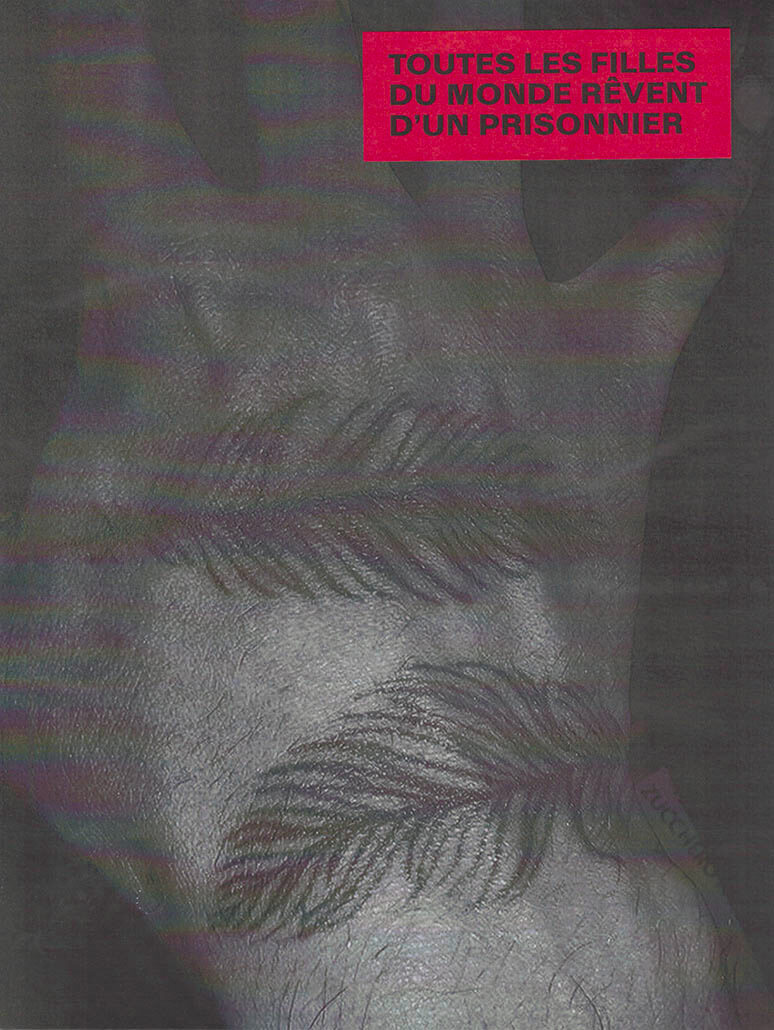
Toutes les filles rêvent d’un prisonnier
Toutes les filles rêvent d’un prisonnier est un fanzine issu d’une correspondance avec un ami incarcéré dans une prison française. Un petit ouvrage de 16 pages qui donne à voir une réalité de la prison depuis l’intérieur. Entre potes, gâteaux et barreaux.
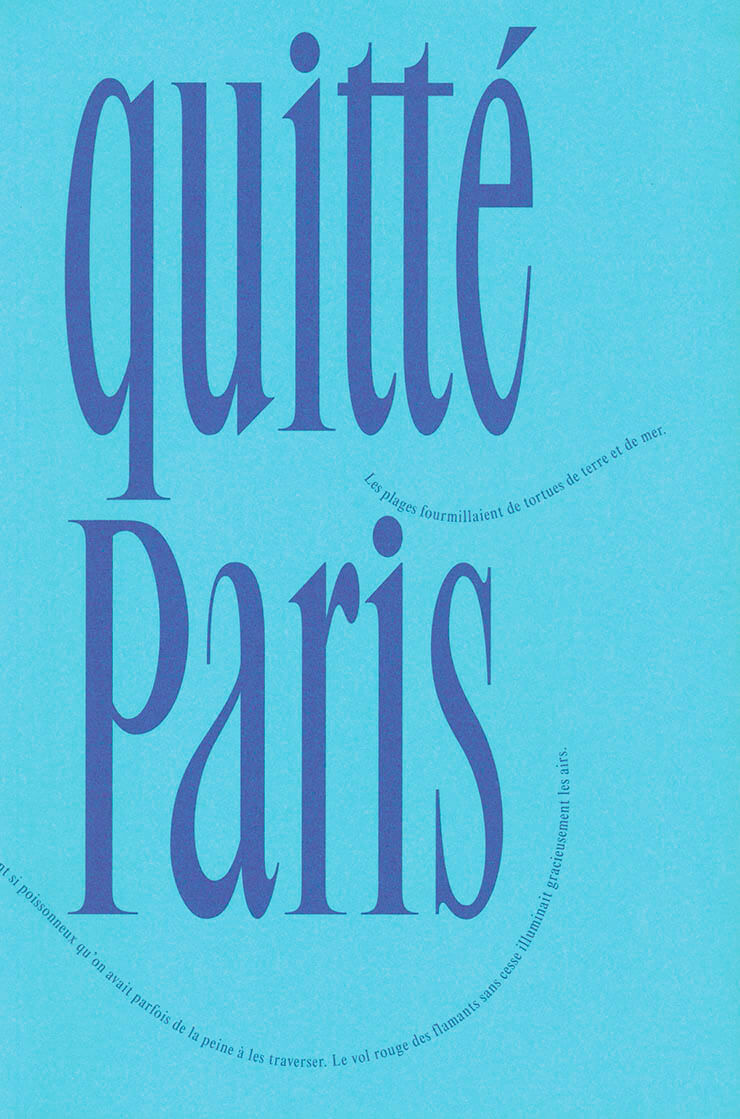
J’ai quitté Paris
J’ai quitté Paris juxtapose des écritures de natures différentes, les unes imageant les autres, parfois lune, regard, tête en l’air, parfois paysage défilant, envolée filante. L’ouvrage s’articule autour de trois textes. Des extraits des Indes Galantes de Jean-Philippe Rameau (1735) ouvrent chaque cahier de texte. Des poèmes de Julien Creuzet composent le corps de texte principal. Ce dernier est accompagné de notes, montages de descriptions paysagères extraites de la collection Toutes nos colonies (1931). Ces extraits ont tous été placés à leur pagination initiale, forçant la rencontre des géographies décrites dans ces ouvrages. Ces ensembles de texte sont séparés par des cahiers d’images, où les photographies de Julien Creuzet se superposent à des détails de l’iconographie de Toutes nos colonies.
J’ai quitté Paris a été conçu lors de l’année de résidence de Julien Creuzet au centre d’art La Galerie à Noisy-le-Sec en 2014. Résidence pensée comme un opéra, qu’il appellera Opéra-Archipel.
Publié avec le soutien de La Galerie, Noisy le Sec, du FRAC Normandie Caen et de la Galerie Dohyang Lee, Paris, France
À lire :
Amadou Elimane Kane à propos de J'ai quitté Paris
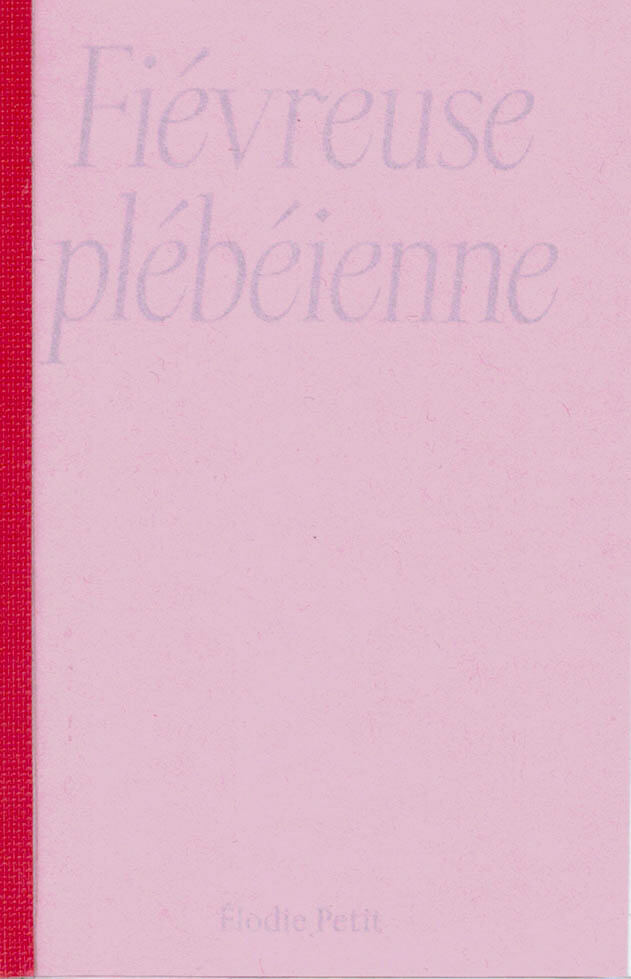
Fiévreuse plébéienne
« On habite ce que l’on peut : la faïence, la baignoire, le hlm, le trottoir, on construit une cabane. Du début à la fin on utilise l’amour comme survie collective. » Fiévreuse plébéienne, Élodie Petit
Fiévreuse plébéienne est un texte en cours qui interroge la façon d’habiter son corps, le monde, ses désirs. Ça parle d’amour, de précarité et de sexualité. Ça emmêle directement le corps au politique, ça prône haut et fort l’expérimentation et le plagiat, ça mélange Dirty dancing pour les gouines et une volonté très forte de faire la révolution. Fiévreuse plébéienne est un livre nouveau de poésie, une recherche durable dans l’écriture sexuelle, une expérience intime.
À lire :
– les zines sur www.elodiepetit.fr
– Elodie Petit : « Que chacune rie à outrance et que les trous du cul soient dilatés » (Fiévreuse plébéienne) de Pierre Niedergang dans Diacritik
– Fiévreuse plébéienne : l’écriture en giclures d’Elodie Petit de Zaz dans Friction Magazine

El uso de las cosas
El uso de las cosas – ou l’usage des choses en français – est une série de photographies prises par Pablo Réol à Mexico City entre 2010 et 2019. Il observe et nous montre la terrible beauté qu’il y a dans ces « choses » : réparations sommaires de carrosseries de voitures, affiches plastifiées au scotch, fixations faites avec des bouts de ficelles, décorations amateures ; ou encore un vendeur de rue revêtu d’un uniforme publicitaire.
Pablo Réol regarde comment l’homme s’approprie son environnement, imagine des solutions pratiques, détourne les fonctions assignées aux objets, aux corps et à l’espace public. En bref, des indices sur la vie dans une grande ville du XXIe siècle.
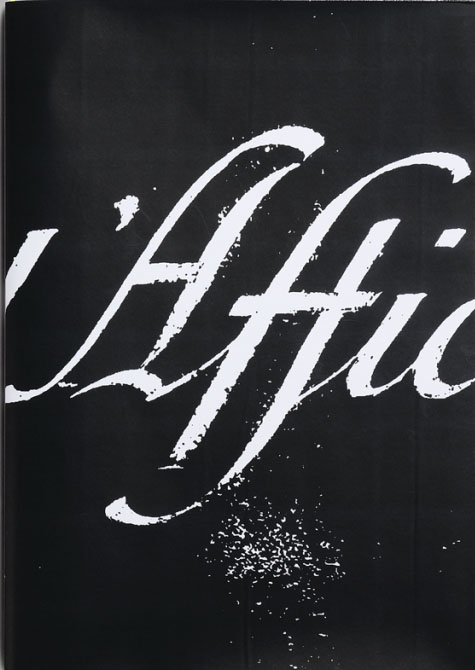
Défense d’Afficher
Défense d’Afficher est un recueil de graffitis politiques relevés en France tout au long de l’année l’année 2019, une période riche en contestations sociales. Une sélection restreinte, à fortiori non exhaustive, mais recouvrant un large panorama des luttes contemporaines qui nous concernent : contre le capitalisme, contre le racisme, contre le pillage du tiers-monde et pour l'accueil des réfugiés, contre le sexisme et les violences faites aux femmes, contre la destruction de la planète, contre cette société néo-libérale, contre la police et ses violences, contre les inégalités sociales, pour l’auto-défense et l’auto-organisation.
Sans oublier d’y faire apparaitre des sujets plus légers ou drôles. Le corps de l’ouvrage qui recueille les graffitis est imprimé sur six affiches jaunes fluo 50 × 70 cm pliées encartées, soutenu par une couverture muette au motif abstrait de peinture à la bombe. L’ensemble est recouvert d’une jaquette imprimée sur des affiches dos bleu accueillant le titre Défense d’Afficher, lui aussi relevé dans l’espace public. Ce fanzine à été produit suite à l’invitation « Impressions libres » d’Étapes et Exaprint.
Ce fanzine étant vendu à prix libre, il n’est pas possible de l’acheter en ligne. N’hésitez pas à nous contacter pour les modalitées de vente.

We Want It All: An Anthology of Radical Transpoetics
An anthology of formally inventive writing by trans poets against capital and empire.
With texts by: Andrea Abi-Karam, New York City Sam Ace, South Hadley, MA Bahaar Ahsan, Berkeley, CA jasper avery, Philadelphia, PA Ari Banias, Berkeley, CA Jo Barchi, Chicago, IL Joss Barton, St. Louis, MO Levi Bentley, Philadelphia, PA Jessica Bet, Baltimore, MA Rocket Caleshu, Los Angeles, CA Ching-in Chen, Seattle, WA listen chen, Vancouver, BC Faye Chevalier, Philadelphia, PA Cody-Rose Clevidence, Arkansas Miles Collins-Sibley, Easthampton, MA Valentine Conaty, New York City CA Conrad, Philadelphia, PA Jimmy Cooper, Rochester, MI Maxe Crandall, Oakland, CA José Díaz, Boston, MA Aaron El Sabrout, New Mexico Ian Khara Ellasante, Lewiston, ME Caelan Ernest, New York City, NY NM Esc, San Diego, CA joshua jennifer espinoza, Los Angeles, CA Logan February, Ibadan, Nigeria Ray Filar, Brighton, UK Nora Collen Fulton, Montreal, Canada Kay Gabriel, New York City Callie Gardner, Cardiff, Wales Jesi Gaston, Chicago, IL Harry Josephine Giles, Edinburgh, Scotland Aeon Ginsberg, Baltimore, MD Caspar Heinemann, Berlin, Germany Kamden Hilliard, Greenville, SC Stephen Ira, New York City Cyrée Jarelle Johnson, New York City Peach Kander, New York City Jayson Keery, Western, MA Evan Kleekamp, Los Angeles, CA Noah LeBien, New York City Ty Little, Richmond, VA Zavé Martohardjono, New York City Amy Marvin, Philadelphia, PA Natalie Mesnard, New York City Bianca Rae Messinger, Iowa City, IA Liam O'Brien, New York City Xandria Phillips, Madison, WI Rowan Powell, Santa Cruz, CA Nat Raha, Edinburgh, Scotland Holly Raymond, Philadelphia, PA Jackie S, New York City Trish Salah, Toronto, Canada Raquel Salas Rivera, Philadelphia, PA Mai Schwartz, New York City Kashif Sharma-Patel, London, UK Julian Talamantez Brolaski, Oakland, CA Charles Theonia, New York City Jamie Townsend, Oakland, CA Nora Treatbaby Laurel Uziell, London, UK Rachel Franklin Wood, Boulder, CO Clara Zornado Akasha-Mitra xtian w. and Anaïs Duplan, NYC.
Kay Gabriel is a poet and essayist. She's the author of Elegy Department Spring / Candy Sonnets 1 (BOAAT Press, 2017), the recipient of fellowships from Lambda Literary and the Poetry Project, and recently completed her PhD at Princeton University.
Andrea Abi-Karam is an arab-american genderqueer punk poet-performer cyborg, writing on the art of killing bros, the intricacies of cyborg bodies, trauma & delayed healing. Their chapbook, THE AFTERMATH (Commune Editions), attempts to queer Fanon's vision of how poetry fails to inspire revolution. Andrea's first book, EXTRATRANSMISSION (Kelsey Street Press, 2019), is a poetic critique of the U.S. military's role in the War on Terror.

Castle Faggot
In Derek McCormack's home province, farm boys with growing pains enjoy a little-known meal called bed-supper, a hearty bowl of sweet breakfast cereal enjoyed as a midnight snack. Here McCormack has composed a peculiarly salacious bed-supper, where the long secret sweet-tooth of the Marquis de Sade glints as it sinks into the dirtiest of dishes. This useful book will more than stay your appetite until breakfast — Castle Faggot is also a manual of redecoration, a musical, a puppet show, a theory of cosmetics, a work of poetics, and a glorious celebration of the French decadence. — Lisa Robertson, author of The Baudelaire Fractal
Derek McCormack is a writer who lives in Toronto. His previous books include The Show that Smells and The Well-Dressed Wound (Semiotext(e)).

Faux Pas
Essays on art-making, abstraction, humor, not-knowing, awkwardness and more, from one of New York’s most influential and popular painters and teachers
Since the 1970s, Amy Sillman—a beloved and key figure of the New York art scene—has developed a singular body of work that includes large-scale gestural paintings blending abstraction with representation, as well as zines and iPad animations.
Over the past decade, Sillman has also produced stimulating essays on the practice of art or the work of other artists: for example, reevaluating the work of the abstract expressionists with a queer eye; elaborating on the role of awkwardness and the body in the artistic process; and discussing in depth the role and meanings of color and shape. Featuring a foreword by Lynne Tillman, Faux Pas is the first book to gather a significant selection of Sillman’s essays, reviews and lectures, accompanied by drawings, most of them made specially for the book.
Faux Pas aims at revealing the coherence and originality of Sillman’s reflection, as she addresses the possibilities of art today, favoring excess over good taste, wrestling over dandyism, forms over symbols, with as much critical sense as humor. As Jason Farago notes in the New York Times, "Sillman is in a thin crowd (with, let’s say, Andrea Fraser, Hito Steyerl, Matias Faldbakken, David Salle) of artists who can really write. The evidence is in Faux Pas ... her writings display the same good humor and intelligence of her best paintings."
Based in New York City, Amy Sillman (born 1955) is an artist whose work consistently combines the visceral with the intellectual. She began to study painting in the 1970s at the School of Visual Arts and she received her MFA from Bard College in 1995. Her work has been exhibited internationally, including at the Whitney Biennial in 2014; her writing has appeared in Bookforum and Artforum, among other publications. She is currently represented by Gladstone Gallery, New York.
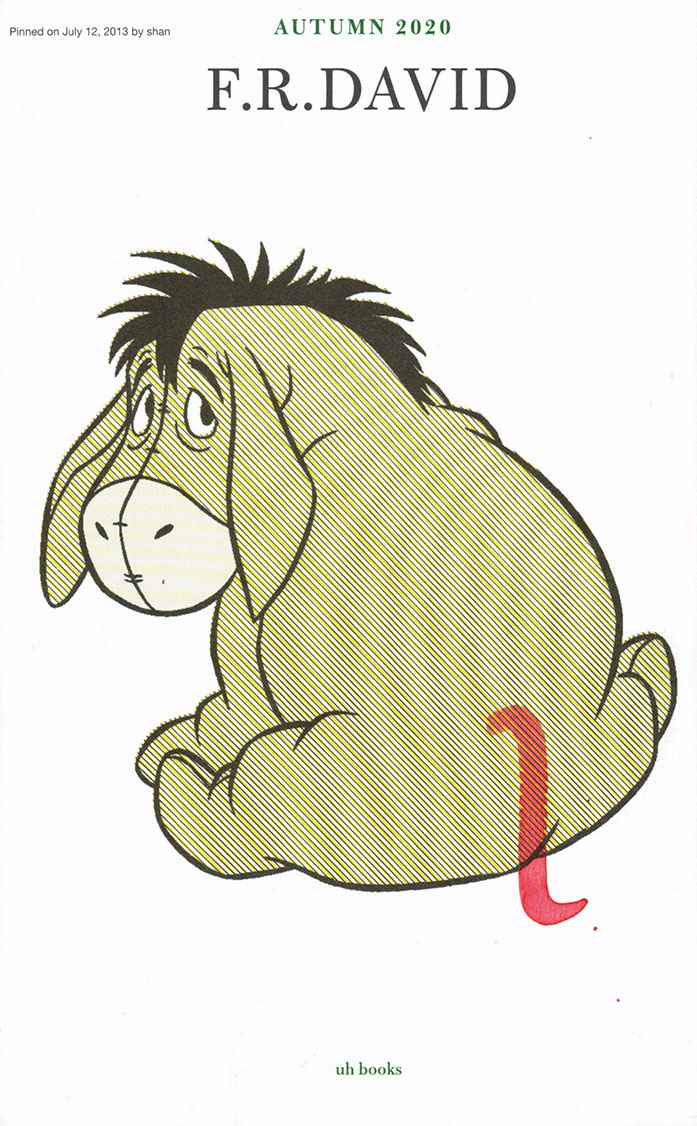
F.R. David - Correctional Facility
F.R.DAVID is a typographical journal, dealing with the organisation of reading and writing in contemporary art practises. The 20th issue, “Correctional Facility” is edited by Will Holder paying attention to difference; and transformations between
accident⎱design 249
acorn⎱oak 293–94, 297–98
adult⎱child 95, 139, 207, 308
alphabetic⎱postliterary 3
alphabetic⎱postalphabetic 3, 5
alphabetic⎱analphabetic 5
analytic⎱linguistic 298
ankh⎱kiss
angles⎱angels 162
aristocrat⎱ass 12
ass⎱man 28
aye⎱eye 160
bad⎱good 130
(outstandingly⎱remarkably)
before⎱after 19, 49, 51, 158,
201, 263, 305
bitter⎱sweet 65, 163, 217
both⎱and 8, 119, 123, 160, 173, 180, 245, 292, 298
cart⎱horse 2, 9
coming into being⎱passing away 318
communism⎱democracy 319
composition⎱improvisation
163, 168, 170
concrete⎱abstract 288
dark⎱light 43, 64, 127, 223,
261, 300, 309, 316
diegetic⎱non-diegetic 145, 193
dropped out⎱drop doubt 160
either⎱or 6, 14, 39, 43, 54, 85, 119, 120, 132, 195, 223, 249, 288
emotional⎱intellectual 297
enthusiastic⎱tempered 13, 78, 205
ἕν καἰ τὀ πᾶν⎱one and all 224
everything⎱fragment 33, 138
everything⎱all things 218–22
experience⎱attention 39, 40, 65, 254–5
green⎱blue 127
high modernism⎱post-structuralist⎱postmodernism 165
radical modernism⎱modernism⎱
postmodernism 4, 164–66
I⎱sigh 160
image⎱word 6, 72, 316–18
Isis⎱Isis 226
jar⎱jars 76, 158, 159
left⎱right 7, 28, 127, 217
meaningful⎱meaningless 258
oak (a⎱ok) 290, 293–94, 297–98
orality⎱textuality 3, 264
phoneme⎱letter 180
phonetic⎱ideogrammatic 297
shit⎱gold †
signal⎱noise 39, 40, 65, 254–55
sweat⎱tears 292
tail⎱bell-rope 151, 154
thesis⎱antithesis 322
written⎱unwritten 158, 296–97
vowel⎱consonant 180–82, 292
we are⎱we ain’t 93
white pawn⎱white pawn 224
word⎱world 8, 12, 138, 160, 165, 166, 180, 183, 260, 265, 287, 298, 300, 315, 317
writing⎱nature 27, 44, 83, 120,
121, 126, 166, 183, 198, 203,
219–20, 252, 297, 318–19
Published October 2020.
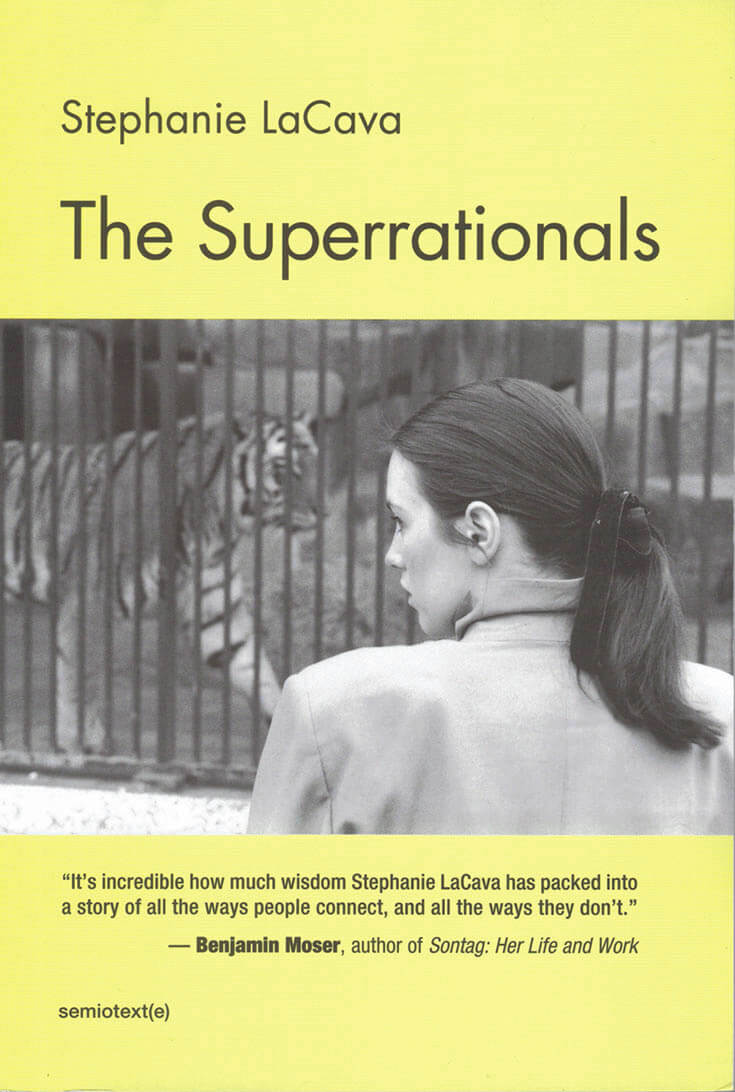
The Superrationals
An erotic and darkly comic novel about female friendship, set at the intersection between counterculture and the multimillion dollar art industry.
Over the course of a few days in the fall of 2015, the sophisticated and awkward, wry, and beautiful Mathilde upends her tidy world. She takes a short leave from her job at one of New York's leading auction houses and follows her best friend Gretchen on an impromptu trip to Paris. While there, she confronts her late mother's hidden life, attempts to rein in Gretchen's encounters with an aloof and withholding sometime-boyfriend, and faces the traumatic loss of both her parents when she was a teenager.

Ghost Image
Ghost Image is made up of sixty-three short essays—meditations, memories, fantasies, and stories bordering on prose poems—and not a single image. Hervé Guibert's brief, literary rumination on photography was written in response to Roland Barthes's Camera Lucida, but its deeply personal contents go far beyond that canonical text. Some essays talk of Guibert's parents and friends, some describe old family photographs and films, and spinning through them all are reflections on remembrance, narcissism, seduction, deception, death, and the phantom images that have been missed.
Both a memoir and an exploration of the artistic process, Ghost Image not only reveals Guibert's particular experience as a gay artist captivated by the transience and physicality of his media and his life, but also his thoughts on the more technical aspects of his vocation. In one essay, Guibert searches through a cardboard box of family portraits for clues—answers, or even questions—about the lives of his parents and more distant relatives. Rifling through vacation snapshots and the autographed images of long-forgotten film stars, Guibert muses, "I don't even recognize the faces, except occasionally that of an aunt or great-aunt, or the thin, fair face of my mother as a young girl." In other essays, he explains how he composes his photographs, and how—in writing—he seeks to escape and correct the inherent limits of his technique, to preserve those images lost to his technical failings as a photographer.
With strains of Jean Genet and recurring themes that speak to the work of contemporary artists across a range of media, Guibert's Ghost Image is a beautifully written, melancholic ode to existence and art forms both fleeting and powerful—a unique memoir at the nexus of family, memory, desire, and photography.
Hervé Guibert (1955-91) was born and worked in Paris. A noted photographer, he also contributed articles on culture to the French newspaper Le Monde and wrote works of fiction and books on photography.

Le Dictateur #05 – FAQ
Myriam Ben Salah, Maurizio Cattelan
FAQ is an accordion-fold art publication edited by Maurizio Cattelan and Myriam Ben Salah and commissioned by Le Dictateur. Coinciding with the 10th anniversary edition of Le Dictateur, the first volume will expand into a yearly series.
FAQ stands for Frequently Asked Questions, referencing an attempt to synthesize a recurrent flow, a tenor, an ideal visual representation of a given and very subjective “now”.
Born out of an accute image eating disorder, FAQ reflects the mental assimilation of a relentless roving within physical and virtual art spaces: from galleries to tumblr accounts, museums, or artists studios; it can be seen as a portable exhibition, a show on paper, a project of restitution, a hybrid object that you can leaf and scroll through. Far from being a rational enterprise because of its lack of rules, hierarchy, order—or concept for that matter—it is expressly and brazenly as personal and biased as possible and reflects the obsessive mannerism of its authors.
Works by Korakrit Arunanondchai, Thomas Bayrle, Neil Beloufa, Judith Bernstein, David Douard, Carroll Dunham, Dan Finsel, Llyn Foulkes, Kathy Grannan, Camille Henrot, Charles Irvin, Elad Lassry, Jon Rafman, Steven Shaerer, Emily Mae Smith, Peter Sutherland, Slavs and Tatars, Andra Ursuta, Aleksandra Waliszewska, Charlie White, Jakub Julian Ziolkowski...
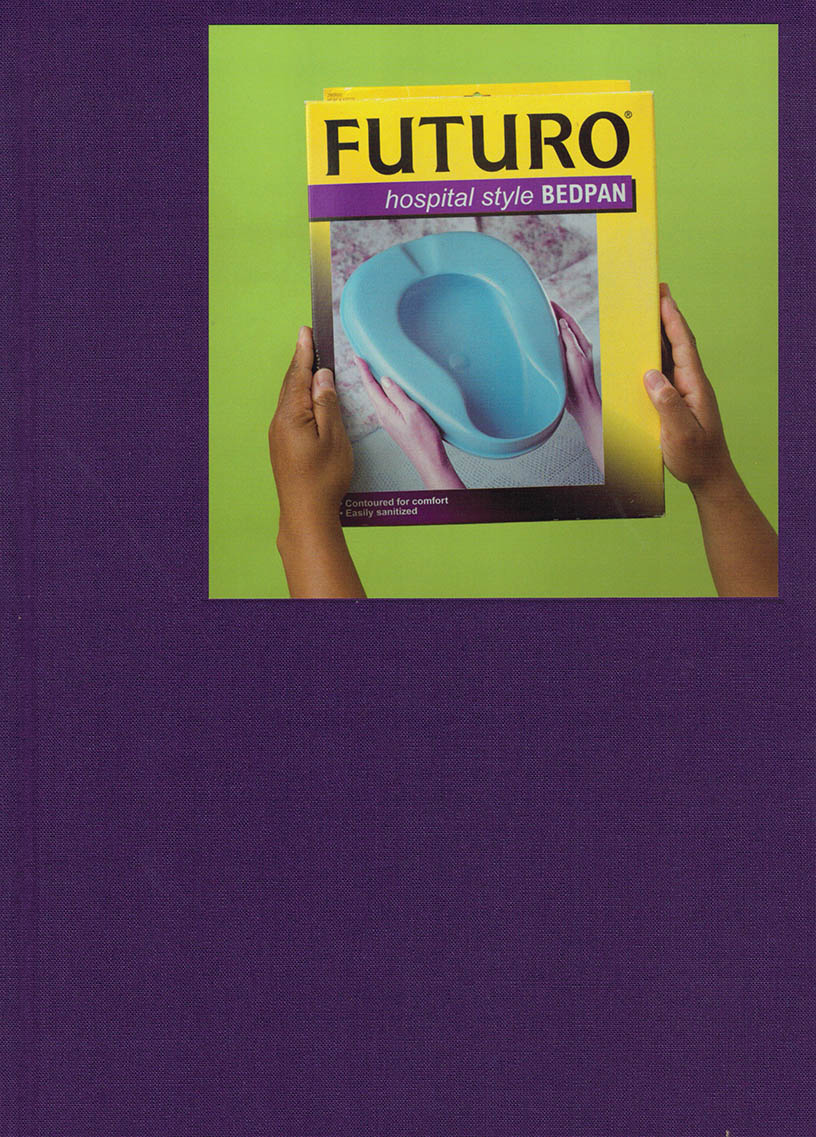
Colored People Time
In 2019, the Institute of Contemporary Art at the University of Pennsylvania presented the experimental exhibition Colored People Time. Divided into three chapters—Mundane Futures, Quotidian Pasts, Banal Presents—it used the Black vernacular phrase Colored People's Time (CPT) to explore the ways that dominant notions of time have been used to control and condemn Black people. CPT names a political performance by Black people to evade and ridicule the enforcement of punctuality and productivity.
Alongside reproductions of historical objects from the Black Panther Party, Sutton E. Griggs, the National Institutes of Health/Getty Images, and the African Collection at the University of Pennsylvania Museum of Archaeology and Anthropology, Colored People Time includes reprints of seminal essays, newly commissioned writing and poetry from Huey Copeland, Eve Ewing, Michael Hanchard, Matthew Angelo Harrison, Amber Rose Johnson, Carolyn Lazard, Jessica Lynne, Tausif Noor, Meg Onli, Gregory Pardlo, M. NourbeSe Philip, Monique Scott, Martine Syms and Michelle M. Wright. Artists include: Aria Dean, Kevin Jerome Everson, Matthew Angelo Harrison, Carolyn Lazard, Dave McKenzie, Cameron Rowland, Sable Elyse Smith and Martine Syms.
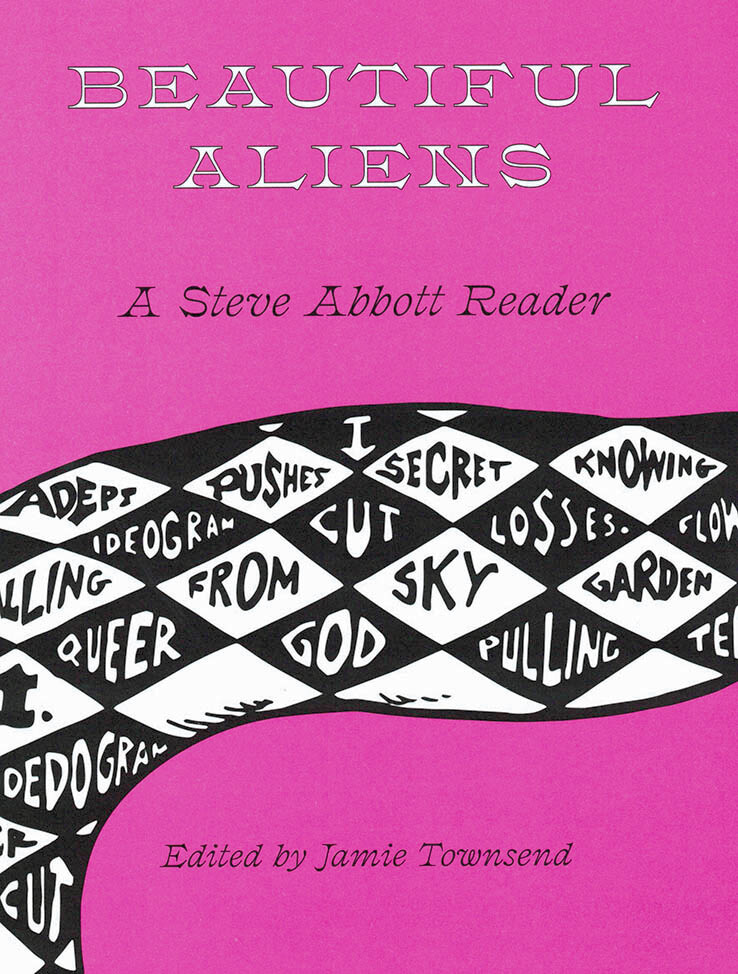
Beautiful Aliens: A Steve Abbott Reader
Beautiful Aliens: A Steve Abbott Reader is a landmark collection representing the visionary life's work of beloved Bay Area luminary Steve Abbott. It brings together a broad cross-section of literary and artistic work spanning three decades of poetry, fiction, collage, comics, essays, and autobiography, including underground classics like, Lives of the Poets and Holy Terror, rare pieces of treasured ephemera, and previously unpublished material, representing a survey of Abbott's multivalent practice, as well as reinforcing his essential role within the contemporary canon of queer arts.
"Holy Terror is good reading, well written and extremely knowledgeable about the subject of magic black and white. In fact, all magic is both."—William Burroughs
"All of us who knew the late Steve Abbott will now be happy that the stone has rolled back, to reveal the amazing accomplishment of Beautiful Aliens, poet Jamie Townsend's masterful take on Steve's multigenre work. Prose, poetry, journalism, the essay, the comic book, the novel: Steve was driven to try his hand at all these categories, excelling more often then you'd think possible. It's time that people knew a genius (of sorts) once lived at the corner of Haight and Ashbury." —Kevin Killian
Steve Abbott (1943-1992) was a poet, critic, editor, novelist and artist. Abbott was raised in Lincoln, Nebraska, graduated from the University of Nebraska, and attended Emory University where he was an organizer for Atlanta's Gay Liberation Front and the gay lib editor at the underground paper The Great Speckled Bird. Abbott moved to San Francisco in 1974 where he became was a frequent contributor to local publications, including The Advocate, The Sentinel, and the Bay Area Reporter. He was also one of the founding editors of the literary arts newsletter Poetry Flash and the publisher/editor of the literary journal Soup. Steve wrote a number of books of poetry and prose during the 1980s and early 90s including: "Wrecked Hearts", "Stretching the Agape Bra", "Lives of the Poets", "Holy Terror", "Skinny Trip to a Far Place", and "View Askew: Postmodern Investigations", a book that collects Steve's essays from The San Francisco Sentinel, The Advocate, and the arts journal Mirage. He was active in various reading series and discussion groups in the Bay Area, including Cloud House and Small Press Traffic, and, in 1981, he co-organized the historic Left/Write conference. Steve was also a respected critic and the first to use the term "New Narrative" to describe the work of contemporaries including Bruce Boone and Robert Glück. Abbott died of complications due to AIDS on December 2, 1992. His novel The Lizard Club was published posthumously. Jamie Townsend is a genderqueer poet, publisher, and editor living in Oakland, California. They are half-responsible for Elderly, a publishing experiment and persistent hub of ebullience and disgust. They are the author of several chapbooks including, most recently, Pyramid Song (2018) as well as the full-length collection SHADE (2015). An essay on the history of the New Narrative magazine Soup was published in The Bigness of Things: New Narrative and Visual Culture (2017).
Published December 2019.
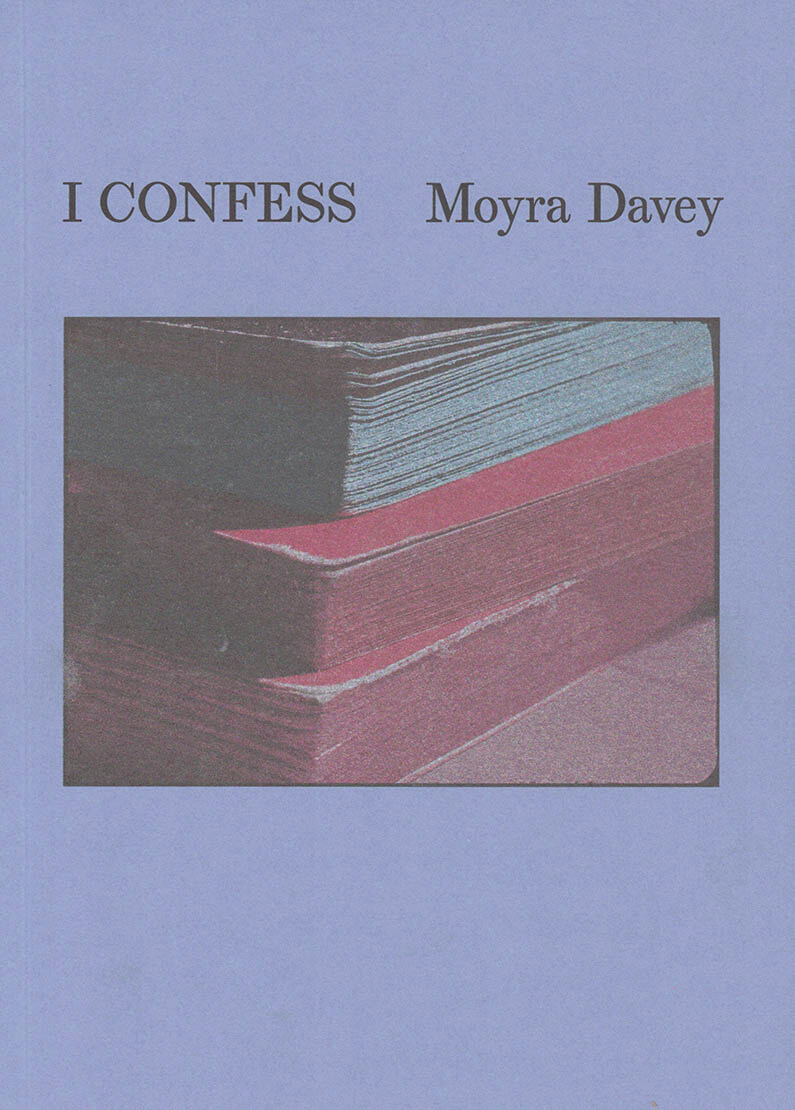
I Confess
Over the past 40 years, Canadian artist Moyra Davey (born 1958) has perfected a unique synthesis of photography, film and text to critically engage with the past, present and future of the world around her. Based on Davey's eponymous 2019 film, I Confess unites three main sources in a chronicle of late 20th-century Quebec, shaped by themes of race, poverty, language and nationalism. Using American writer James Baldwin's 1962 novel Another Country as its point of departure, Davey's film also focuses on the life and work of Québécois revolutionary Pierre Vallières and Ottawa-based political philosopher Dalie Giroux.
Published to accompany the exhibition Moyra Davey: The Faithful at the National Gallery of Canada, this deeply personal and highly political book seeks to examine an unresolved chapter of Québécois history from a uniquely interdisciplinary perspective that draws attention to contemporary issues of separatism, while reflecting the artist's understanding of photography and text as unique corollaries. This publication features writings by the artist, Dalie Giroux and National Gallery of Canada's Associate Curator Andrea Kunard, and a poster insert.
Published September 2020.

DRINK DEEPLY AND DREAM
Drink Deeply and Dream by Elspeth Walker is an ethereal, offbeat short story about wannabe vampires with a Marxist bent and their search for salvation from capitalism via eternal bloodlust.
Paperback, Staple Bound and Offset Printed

My Paris
In My Paris, a Canadian woman keeps an extraordinary journal of her time in a Parisian studio. Not a typical tourist, she prefers indoor spaces, seeing Paris go by on TV or watching from her window the ever-changing displays of men's designer clothing across the boulevard. Or she roams the streets, caught between nostalgia and a competing sense of the present day, between Paris's rich cultural traditions and the realities of Western imperialism. Disillusioned by her inability to reconcile these contradictions and by her own part in perpetuating them, she assembles in her journal pieces of the present, past, of art, philosophy, of herself, and of the world outside her.
Gail Scott is a writer and translator. She has been short-listed twice for the QSPELL (Québec English-language fiction) award. A former journalist who has worked for Canada's leading newspapers, she is also a founding editor of the Montreal French-language cultural journal Spirale, and the bilingual journal of women's writing, Tessera. Her translations include France Thoret's Laurence, and The Sailor's Disquiet, and Helen with a Secret, both by Michael Delisle.
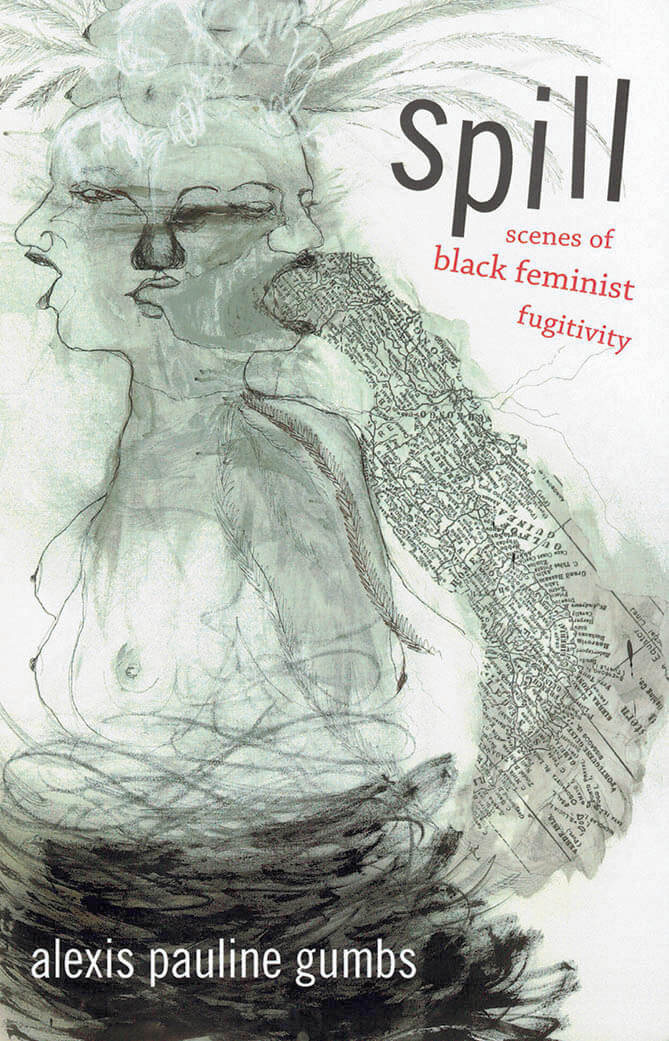
Spill: scenes of black feminist fugitivity
In Spill, self-described queer Black troublemaker and Black feminist love evangelist Alexis Pauline Gumbs presents a commanding collection of scenes depicting fugitive Black women and girls seeking freedom from gendered violence and racism. In this poetic work inspired by Hortense Spillers, Gumbs offers an alternative approach to Black feminist literary criticism, historiography, and the interactive practice of relating to the words of Black feminist thinkers. Gumbs not only speaks to the spiritual, bodily, and otherworldly experience of Black women but also allows readers to imagine new possibilities for poetry as a portal for understanding and deepening feminist theory.
Alexis Pauline Gumbs is a poet, independent scholar, and activist. She is coeditor of Revolutionary Mothering: Love on the Front Lines and the Founder and Director of Eternal Summer of the Black Feminist Mind, an educational program based in Durham, North Carolina.

Kino/ Atelier - Program
With texts and contributions by Nicholas Vargelis, Kerstin Stakemeier, Steve Beck, Lis Rhodes, Leslie Bauer, Érik Bullot, C.Vanaik, VUE Committee, Shirley Clarke, Hilary Harris, Giuliana Bruno, Pier Paolo Pasolini, Peter Larsen, Elissa Suh, Straub-Huillet, Storm de Hirsch, Mark Fisher, Bruce Baillie, Rachel Haidu, Kai Althoff, Jennifer Reeves, Karl Holmqvist, Eros in Le Wind, Marie Menken and Jonas Raam.

In Alphabetical Order
Facsimile of the seminal magazine created by Ulises Carrión and Cres, originally published in 1978. In this photographic book—one of very few of Carrion's entire practice—the author is very critical about his own affiliation with the mail art movement. The book presents a series a photographs of his calling card filing box, which the author juxtaposes with witty and poignant captions.
“This book of mine is partly real facts and partly fantasy. The real fact is that I love lists of names, card indexes, information retrieval systems, that sort of thing. No wonder I have an archive at home, the Other Books and So Archive, which includes a collection of artist's books.”
Ulises Carrión (1941-1989) is one of the most important figures of Mexican conceptual art. His 1975 manifesto The New Art of Making Books help defined artist's books as an autonomous artistic genre. His work includes numerous artist's books—which was then designated as bookworks—but also video art, sound arts, performance and mail art.
